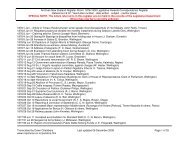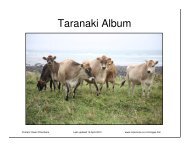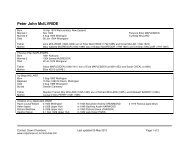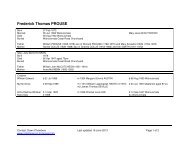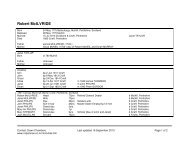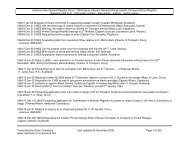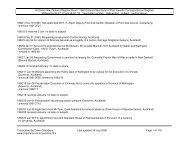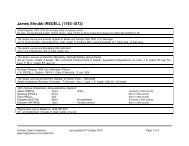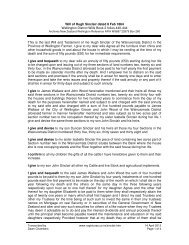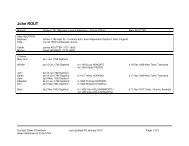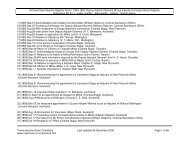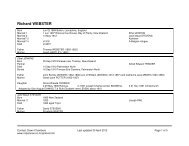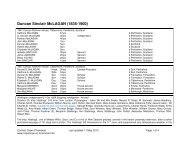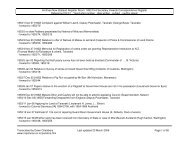Percival Trosse FORTESCUE - New Zealand Pictures
Percival Trosse FORTESCUE - New Zealand Pictures
Percival Trosse FORTESCUE - New Zealand Pictures
Create successful ePaper yourself
Turn your PDF publications into a flip-book with our unique Google optimized e-Paper software.
<strong>Percival</strong> <strong>Trosse</strong> <strong>FORTESCUE</strong><br />
Born 16 Mar 1843 Churchstow, Devon, England<br />
Married 5 Feb 1867 Park Place, Wanganui, <strong>New</strong> <strong>Zealand</strong> Agnes Crocker JENKINS<br />
Died 11 Jan 1892 Tiverton, Devon<br />
Father Henry Reymundo <strong>FORTESCUE</strong> (1820-1898)<br />
son of Edmund Nathaniel William <strong>FORTESCUE</strong> (1777-1821) and Elizabeth TROSSE (-1865)<br />
Mother Helen WALSH (1820-) dau of <strong>Percival</strong> and Mary WALSH<br />
Agnes Crocker JENKINS<br />
Born 4 Nov 1845 Cloudy Bay, Marlborough, <strong>New</strong> <strong>Zealand</strong><br />
Died 29 Jan 1916 Havant, Hampshire, England<br />
Father William JENKINS (1813-1867) son of Robert JENKINS (c1778-1849) and Agnes CROCKER (1780-1850)<br />
Mother Catherine Jane MEWIS (1820-1883) dau of James MEWIS (c1789-) and Jane TUTIN<br />
Contact: Dawn Chambers Last updated 14 July 2010 Page 1 of 19<br />
www.nzpictures.co.nz/fortescue.htm
1851 Census East Allington Rectory, Devon, England<br />
Henry R. <strong>FORTESCUE</strong> Head 31yrs Rector of East Allington b East Allington, Devon<br />
Ellen <strong>FORTESCUE</strong> Wife 31yrs b Oxford, Oxfordshire<br />
<strong>Percival</strong> <strong>FORTESCUE</strong> Son 8yrs Scholar at home b Churchstowe<br />
Henry <strong>FORTESCUE</strong> Son 6yrs Scholar at home b East Allington, Devon<br />
A. E. <strong>FORTESCUE</strong> Dau 6yrs b East Allington, Devon<br />
B. C. <strong>FORTESCUE</strong> Dau 2yrs b East Allington, Devon<br />
H. H. <strong>FORTESCUE</strong> Son 1yr b East Allington, Devon<br />
M. A. PITI 27yrs Governess [unmarried] b Beckleish<br />
Henry NICHOLLS Servt 35yrs Groom [married] b Harburten, Devon<br />
Thos LANE Servt 16yrs Indoor servant [unmarried] b Kings Cross, Devon<br />
Amelia PARKER Servt 21yrs Nurse [unmarried] b Frogmore, Devon<br />
J. S. HOLWITH Servt 21yrs Housemaid [unmarried] b <strong>New</strong>ton Bushell<br />
H. IRELAND Servt 32yrs Cook [unmarried] b Crediton, Devon<br />
1861 Census Rectory House, East Allington, Devon<br />
Henry B. <strong>FORTESCUE</strong> Head 41yrs Rector of East Allington b East Allington, Devon<br />
Ellen <strong>FORTESCUE</strong> Wife 41yrs b Oxford, Oxfordshire<br />
<strong>Percival</strong> <strong>FORTESCUE</strong> Son 18yrs [unmarried] b Churchstow, Devon<br />
Amy E. <strong>FORTESCUE</strong> Dau 14yrs b East Allington, Devon<br />
Matthew R. <strong>FORTESCUE</strong> Son 6yrs b Jersey<br />
Ellen B. T. <strong>FORTESCUE</strong> Dau 2yrs b East Allington, Devon<br />
Eliza CHAMBERS Servt 56yrs Cook house servant [unmarried] b Holedmile, Devon<br />
Mary COOK Servt 20yrs House servant [unmarried] b Buxhem, Devon<br />
London Gazette 7 Jan 1862 p74 War Office - 24 th Foot<br />
<strong>Percival</strong> <strong>Trosse</strong> Fortescue, Gent., to be Ensign, by purchase, vice Reginald Simon Fraser appointed to the 63 rd Foot. Dated 8 th January 1862.<br />
London Gazette 22 Mar 1864 p1714 War Office – 24 th Foot<br />
Colour-Serjeant William Hughes, from the 12 th Foot, to be Ensign, by purchase, vice <strong>Percival</strong> <strong>Trosse</strong> Fortescue, who retires. Dated 22 nd March,<br />
1864.<br />
Contact: Dawn Chambers Last updated 14 July 2010 Page 2 of 19<br />
www.nzpictures.co.nz/fortescue.htm
Daily Southern Cross 4 Nov 1864 Port of Auckland - Shipping Cleared Outwards<br />
Nov 3 – Lord Ashley, 296 tons, Randall, for Southern Ports, with 3 boxes, tobacco and 1 case, 10 casks wine, 1 case, 220 sheep, 118 packages<br />
sundries. Passengers – Mr Otway, Mr Otway, Junr., Mr Fortescue, Mr and Mrs Tucker, Mr and Mrs Thompson, Mr Grey, 1 soldier 14 th Regiment,<br />
Mr Worrall, Capt. Sharpe, Messrs Smith, Walden, Lopdell, G. Howes, Luxton, Meddins, Moss.<br />
The s s Lord Ashley left the harbour at noon yesterday for the Southern Ports.<br />
1864 Nov 05 DOCUMENT: Daily Southern Cross – The Surat, from London<br />
Wairoa: Military History of Waverley by C. L. Lovegrove p3-4<br />
Lt-Colonel E. Gorton reports the arrival in Wanganui of those due for discharge on 29 th August 1866. “I have to report for the information of the<br />
Hon. Minister of Defence that S.S.’Waipara’ arrived today from Patea bringing Non-commissioner Officers and Men from Patea of Taranaki Military<br />
Settlers strength as per margin – 3 Officers, 6 Sergeants, 43 rank and file – who have declined service any longer. I annexe the Marching State. A<br />
sum of $380 for No.8 Company and $320 for No.10 Company suggest the numbers from each company leaving the service were about equal.<br />
Captain Thomas Wilson and Lieutenant A. C. Fookes were officers commanding the detachment. An extract from a report to the Under-Secretary<br />
of Defence on 13 th September 1866… Lt-Colonel Gorton writes: “Several of the men entitled to land orders have left, in some instances having<br />
sold their land, but all have deputed agents to receive their land orders for them who produce Powers of Attorney accompanied in all cases by<br />
certificates of good character. I have, of course, handed those land orders over to the agents and detained their Powers of Attorney as my<br />
authority for giving the land order to them. In nearly every case men of the same company have been employed as agents for their comrades who<br />
have gone to different parts of <strong>New</strong> <strong>Zealand</strong> and other colonies.” The Monrad brothers and P. T. Fortescue appear to be two officers who retired<br />
from the service in August but only Captain A. G. Smith and Lieutenant A. C. Fookes seem to have taken any interest in the Militia after the ration<br />
period ended.<br />
London Gazette 12 Feb 1867 p763 Commissions signed by the Lord Lieutenant of the County of Devon<br />
South Devon Militia. <strong>Percival</strong> <strong>Trosse</strong> Fortescue to be Lieutenant. Dated 11 th January, 1867.<br />
Otago Witness 30 Mar 1867 Wellington(from our own correspondent) 21 st March, 1867<br />
I extract from the Independent of this morning the following particulars relative to the new constabulary force about to be raised. The information<br />
is, I believe, exactly correct. You will notice that the force is to be stationed in those parts of the Island where their services are most likely to be<br />
required. Tauranga is the scene of their first operations, unless perfect quiet should be restored earlier than is expected:- “Measures for the<br />
organisation of a mounted armed constabulary force, the formation of which was first mooted in the last session of the Assembly, have reached so<br />
advanced a stage that the strength of the force has been determined upon, and a number of gentlemen recommended as officers by Major<br />
McDonnell. It is stated that the force will consist of 300 men, six troops of 50 each, and will be made up from the existing remnants of colonial<br />
forces and men formerly belonging to colonial corps. These troops will be posted in those parts of the Northern Island where their services are<br />
most likely to be required. The gentlemen who have been recommended by Major McDonnell for commissions are: Captain Ross of the Wanganui<br />
Rangers; Captain <strong>New</strong>land, Patea Rangers; Cornet Kennik, Wanganui Cavalry; Lieut. Gudgeon, Native Contingent; Lieut. Fortescue, Patea<br />
Contact: Dawn Chambers Last updated 14 July 2010 Page 3 of 19<br />
www.nzpictures.co.nz/fortescue.htm
Rangers; Lieut. O’Callaghan, Wanganui Rangers; Ensign <strong>New</strong>land, Wanganui Rangers; Ensign Walker, Native Contingent.; Lieut. Fookes and<br />
Ensign Gloag, Taranaki Military Settlers.” Major Macdonell has gone to Tauranga, where he relieves Colonel Haultain.<br />
Wanganui Museum MS 101 [1802.1648.3] Order Book Pay Masters Office 1868 from 1 July 1868 to 1 Oct 1868 – Spine Label ‘3’<br />
District orders - 7 Aug 1868 Ensign Fortescue is taken on pay from this date incl.<br />
District orders (2 nd group) – 7 Aug 1868 Ensign Fortescue is taken on pay from this date incl. and will proceed at 10 a.m. tomorrow to Kakaramea<br />
to relieve Ensign Northcroft in the command of that post who has requested leave to resign & which request has been acceded to.<br />
Nelson Examiner and <strong>New</strong> <strong>Zealand</strong> Chronicle 20 Jan 1869 A Rebel Raid<br />
The following is from the Wanganui Chronicle, of the 12 th instant:- “The rebels, we daresay, had heard of the ‘fix’ with our cavalry, consequent on<br />
the arrest of the officers, and thought they might once more do a little business in the fire-raising way with impunity. They tried it, although barely<br />
with the success they anticipated. On Saturday afternoon the barn and some other small out buildings belonging to Mr Baker, which had been left<br />
standing when the dwelling-house was burned, were observed to be in flames, and these were followed immediately after by the adjoining furze<br />
hedges. The Kai-Iwi cavalry were mustering at their camp at the time, and the order to saddle up and be off was given at once. Away galloped the<br />
troop with the lieutenant at their head. On reaching the scene, they found the enemy had gone, but not without driving off all the horses in the<br />
neighbourhood with them. In fact they appeared as if determined to make a clean swoop, for the animals that would not drive they had shot, and<br />
these wounded horses were found not far from the place. Here then the chase was taken up by the troop, and a somewhat circuitous route chosen<br />
in the hope of getting before the marauders and cutting off their retreat. The cavalry, however, were too late; the enemy were past before they<br />
reached the track, but manifestly the latter had found themselves so hotly pursued as to be compelled to give up driving the horses. The booty had<br />
been relinquished, and the most of the horses have since found their way back to their accustomed feeding ground. We ought to mention, more<br />
especially as it is the first of the kind, that immediately on Sub-Inspector Fortescue, who is in charge of the Constabulary at Mount Bryce, being<br />
apprised of the movement of the cavalry, he turned out twenty of his men and gallantly marched at once in the direction they had taken. It came to<br />
nothing in this instance, but most certainly if the cavalry had succeeded in intercepting the Maoris it would have been of decided importance, and<br />
told with great effect upon the enemy. We understand that Colonel Lyon, immediately on the arrival of an orderly with the intelligence at<br />
Westmere, also turned out the mounted constabulary there. They rode to Baker’s, but of course, as we have already indicated, there was nothing<br />
to be done.”<br />
Taranaki Herald 4 Nov 1871 Private Theatricals at Patea<br />
An amateur performance took place on Thursday evening, the 27 th October, in the Foresters’ Hall, in aid of the funds of the Patea Dramatic<br />
Society, on which occasion was presented the laughable farce of “Fish out of Water.” The part of Sam Taylor was taken by Mr George Sherwood<br />
and was admirably played, the only fault that could be found with that gentleman’s acting being that he rather over did some parts; but for an<br />
amateur I have seldom seen the part played so well. Mr Cowan as Sir Charles Clifford looked and played the part perfectly. Mr Fortescue as<br />
Charles Gayfore was the character to appearance but was rather tame in his acting. Mr Meredith as the steward was all that could be desired. Mr<br />
Dundas as Alderman Gayfore reminded me of the good old aldermen of olden times, and was the best played part of the performances. Last<br />
though not least I must say, Mr Black’s “make-up” and rendering of Mill Ellen Courtly, was capital. On the whole “Fish out of Water” was a great<br />
success. A cornet solo followed the first piece, and with which all seemed pleased. Then came the great hit of the evening – the “Nervous Cures”<br />
Contact: Dawn Chambers Last updated 14 July 2010 Page 4 of 19<br />
www.nzpictures.co.nz/fortescue.htm
– in which Dr Walker and Mr Meredith excelled themselves. The “make-up” of both these gentlemen was capital, and from the moment they came<br />
on the stage till the downfall of the curtain, kept the audience in one continued roar of laughter and had to reappear to a tremendous encore. Then<br />
followed an Irish comic song by Mr Whealan, which passed off tolerably well, I think his age is a little against him. Mr Isaacs next appeared, and as<br />
usual delighted the audience with two capital comic songs. The performance concluded with the well known farce of “Chaos is come again,” in<br />
which Dr Walker sustained the part of Mr Jacob Bunce, a gentleman that had seen the world; and very excellently the part was rendered. The<br />
Doctor gave himself thoroughly over to the business of the stage; and I must say of this gentleman there is a light comedian lost in him. Mr<br />
Meredith’s rendering of “Colonel Chaos,” was a first-class piece of acting, and the make-up good in the extreme, but I cannot imagine why he had<br />
two corks in his mouth; and think next time he plays the old man he would do better without the above-named article. Mr Perry played the Landlord<br />
to the life. In this piece, as in the first, Mr Black was quite the lady. The rest of the characters, by Messrs Beamish, Potts and Duncan, were very<br />
creditably played. On the whole the performance was a great success; the hall was crammed, the reserved seats being filled with ladies. If a<br />
crowded house and the satisfaction of delighting an audience be any encouragement for amateur theatricals, another performance by the Patea<br />
Dramatic Society may soon be expected, and I wish them every success.<br />
Taranaki Herald 13 Apr 1872 Caution to the Public<br />
The Postmaster begs to notify that the following Government Cheques have been stopped, and the public are cautioned against cashing or<br />
receiving them:- No.690, £9 9s 10d, drawn by H. F. Turner, in favour of <strong>Percival</strong> Fortescue.<br />
Wanganui Herald 19 Dec 1876<br />
At the Resident Magistrate’s Court this (Tuesday) morning the following cases were adjourned till the 29 th by Major Nixon, JP., the presiding<br />
magistrate:- John Anderson v. <strong>Percival</strong> T. Fortescue.<br />
Wanganui Herald 16 Jan 1877 Resident Magistrate’s Court<br />
John Anderson v. P. T. Fortescue, claim £8 4s 8d; judgment for amount and costs.<br />
Waverley: The Early Years by Laraine Sole (1997) p30 Waverley Snippets<br />
Occupations 1879: P. T. Fortescue, Commission Agent<br />
[probably from H. I. Jones & A. D. Willis’s Directory 1880]<br />
Contact: Dawn Chambers Last updated 14 July 2010 Page 5 of 19<br />
www.nzpictures.co.nz/fortescue.htm
Wanganui Herald 12 Feb 1879 Election for Patea Harbour Board – Waverley Riding<br />
The Waitotara return having been received soon after seven o’clock, the returning officer, P. T. Fortescue, was able to make the official<br />
declaration on the evening of the election day with the above result. The proceedings throughout the day, either Waverley or Waitotara, were not<br />
of a very animated description. It has been determined to call a meeting of all those interested to consider the proposal of the Patea County<br />
Council to erect a tollgate on the approach to the Waitotara Bridge. The probable date will be Friday next, and the place Waitotara.<br />
Waverley Waitotara Total<br />
James Southcombe 15 32 47<br />
Francis Symes 34 0 34<br />
W. A. G. Winchcombe 1 7 8<br />
Evening Post 11 Oct 1879 Port of Wellington Arrivals<br />
October 11 – Patea, ss, 50 tons, Gibbons, from Patea. Passengers: Cabin – Misses Hurley (2). Younger, Sergeant Richmond, Messrs Fortescue<br />
and Broderick; Constable O’Brien and 1 lunatic.<br />
Wanganui Herald 17 Oct 1879 Resident Magistrate’s Court before E. Hardcastle – Civil<br />
J. H. Horn v. P. F. Fortescue, judgment for plaintiff for £1 12s 6d and costs 6s.<br />
Wanganui Herald 22 Oct 1879<br />
The following notice appears in the last Gazette W <strong>Percival</strong> <strong>Trosse</strong> Fortescue, late 24 th Foot, to be Sub-Inspector, date of commission 11 th<br />
October, 1879.<br />
Otago Witness 24 Jan 1880<br />
The special correspondent of the Lyttelton Times, telegraphing from Normanby, says:- “The officers and men of the Armed Constabulary, who<br />
have been led to believe they would positively take possession of the Plains shortly, are complaining bitterly that the splendid weather for<br />
campaigning now prevailing is being allowed to slip away. They are eager to take the field, not so much in the prospect of fighting, as to break the<br />
monotony of a month’s life in the redoubts. Colonel Roberts and the officers under him, Captains Marshall, Taylor, Baker, and Fortescue, are to be<br />
complimented upon the splendid discipline and morale of the men under their command. Anything like the commission of petty offences is utterly<br />
unknown, and so far as the feeling of the men towards their officers is concerned, they would follow them anywhere should hostilities break out.<br />
Major Gordon at Opunake is also a great favourite with his men. Colonel Roberts, commanding the Forces, is apparently in utter ignorance of the<br />
latest intentions of Government, but informs me that the men under him are in splendid trim for the field, and that generally, in his experience, the<br />
Colony was never in a better position than now to tackle the Native difficulty. Independently of Natives from other parts who may assemble at<br />
Parihaka, it is calculated that there were from five to six hundred fighting men on the Plains, but whether they will fight or not appears to be a fine<br />
toss-up. There is nothing for it but to stand and watch proceedings.”<br />
Contact: Dawn Chambers Last updated 14 July 2010 Page 6 of 19<br />
www.nzpictures.co.nz/fortescue.htm
Wanganui Herald 26 Jan 1880 The Waimate Plains – The Armed Constabulary take possession (from our correspondent) Hawera, Jan 26.<br />
The Hon. Mr Bryce and Major Noake went to Opunake on Saturday and returned yesterday. Colonel Roberts, with the force, marched on to the<br />
Plains in martial style, headed by the excellent Waihi band, and crossed the Waignongoro bridge at 8 o’clock this morning; no sign of any natives.<br />
They were quite friendly and jocose, and say they will sell the force potatoes and pigs. They leave the settlement of the land question with Te Whiti<br />
and the Commission. They say road making is very good. I left Roberts and men just now busy clearing and preparing for camping on the banks of<br />
the Kaupuni, about eight miles from Hawera, Major Goring, with the Opunake detachment, is expected at the new camp, say Fort Roberts, this<br />
evening. Our men, with Captains Marshall, Taylor and Fortescue, are in the best humour. Waingongoro redoubt has been abandoned. The people<br />
here look upon the movement with calm satisfaction, having no fear of any evil consequences. Major Brown and Mr Williams visited most of the<br />
Plains settlements on Saturday. I understand the natives were very reserved.<br />
Taranaki Herald 26 Jan 1880 The Waimate Plains<br />
Normanby, January 26, 1.38 p.m. – The Armed Constabulary, commanded by Colonel Roberts, Captains Marshall, Taylor and Fortescue,<br />
marched from Waihi at 6.45, and at 9.15 a.m. reached Kapuni, where they intend to make their first camp, and probably build a redoubt.<br />
North Otago Times 27 Jan 1880<br />
Normanby, January 26. The Armed Constabulary, commanded by Col. Roberts, Captains Marshall, Tyler, and Fortescue, marched from Waihi at<br />
6.55, and reached Kapunai at 9.15, where they intend to make their first camp, and probably build a redoubt.<br />
Taranaki Herald 28 Jan 1880 Hawera – Movement of the forces (from our own correspondent – January 27, 1880<br />
After so many reports of the occupation of the Plain we were rather sceptical of the one last week, although somewhat authenticated by the<br />
presence of the Hon. Mr Bryce in the district. He arrived on the afternoon of Friday, and had a long interview with Colonel Roberts the same night.<br />
It was understood on Saturday morning that some definite step was about to be taken, and this was heightened by the A.C.’s, well equipped,<br />
marching through Hawera about eleven o’clock, playing “The girl I left behind me.” In fact, I hear that most of them thought they were then and<br />
there going to march on the Plains – in such ignorance of their probable movements were they kept. Upon their returning to camp they were<br />
informed that they had to hold themselves in readiness to march at any moment, and that most likely they would have to shift camp on Monday<br />
morning. This was received with three cheers from all the men, who had got thoroughly disgusted with the inactive life they were leading at Waihi.<br />
Mr Bryce arrived at Waihi from Opunake on Sunday morning, and then definite instructions were given that 120 men from Waihi would be<br />
marched on the Plains the first thing on Monday morning. The carters were told to be in readiness to take baggage, &c. Major Goring would also<br />
march his detachment of 80 men from Opunake the same morning. All this news was received at Hawera with calm satisfaction. There was no<br />
excitement, as the settlers well knew that the Maoris would offer no resistance. Waihi, at about 5 o’clock a.m. yesterday, was a scene of bustle<br />
and noise; comrade wishing comrade au revoir; husbands (well, I’m not a married man myself, so don’t know how they say good bye to their<br />
wives); drays loading, falling in, &c &c., and then the march on about the worst day one could possibly have chosen for marching – close, muggy<br />
weather, with a sufficiency of wind to create any amount of dust; but the Waihi band did their best to make the men forget this slight<br />
inconvenience, by striking up martial airs. Colonel Roberts, of course, was in command, his officers being Captains Marshall, Taylor, and<br />
Fortescue, Captain Baker being left in charge of Waihi. About 10 they arrived at the Kapuni Stream, some five miles on the Waimate Plains, where<br />
Contact: Dawn Chambers Last updated 14 July 2010 Page 7 of 19<br />
www.nzpictures.co.nz/fortescue.htm
they took up their position in an old Maori pah, which had been selected by Mr Bryce and Colonel Roberts. It is a good stronghold, and commands<br />
a fine look-out. The fact of our thus using the old fortification of the Maoris is considered a good joke; but otherwise it proves that this position is a<br />
good one, as the Maoris never built fortifications in weak places. The men are really a grand lot of fellows and I think we need not be afraid of their<br />
giving a bad account of themselves, should anything happen; but I think the chance of any encounter is very remote. I believe Te Whiti is getting<br />
down from his hobby-horse, and talking more sense than he usually does.<br />
Evening Post 29 Jan 1880 The March on to the Waimate Plains<br />
The correspondent of the Lyttelton Times gives a very graphic account of the march of the Armed Constabulary on to the Waimate Plains. He<br />
writes from Normanby, on Monday last, as follows: Normanby, 26 th January. At an early hour this morning the camp was astir, the order having<br />
been issued on the previous evening to parade at 6 a.m. today in heavy marching order. The scene for the time was very animated, and the men<br />
were ready for the march in a remarkably short space of time. Considerable delay, however, occurred owing to the contractor for the transport<br />
service not being up to time, and it was nearly 8 o’clock before a start was made. The men left the camp two-deep, headed by the band playing<br />
lively airs. When the band ceased to play the men began to sing, and kept it up at intervals throughout the long and dusty march. Colonel Roberts,<br />
the Commanding Officer, and Senior Captain, and Captain Marshall, were on horseback; but Captain Taylor and Captain Fortescue, commanding<br />
the detachment, marched with the men, carrying their blankets and other camp requirements in the same manner as the men. At the crossing of<br />
the Waingongoro bridge, which may be considered an important event in the history of the colony, a number of mounted settlers had gathered<br />
upon a hill immediately overlooking the roadway, and watched with deep interest the act of crossing over, which is generally regarded as the first<br />
formal act in the initiation of an entirely new policy in native affairs. The band did not play in going over the bridge, as it was thought in certain<br />
quarters that this might have been interpreted as a demonstration of defiance. From the bridge to the camping ground on this side of the Kapune<br />
Creek the distance is five or six miles, along a dusty road, and the men suffered great inconvenience from the dust and heat. While the<br />
detachment was on the march across the plains, your correspondent and three others struck off through the flax to a pah a mile or two beyond the<br />
Kapune, and told the natives of what had occurred. The reply was, “Good! The soldiers have come to make a road for us to go to Parihaka.” There<br />
seemed not the slightest resentment among them, but a kind of calm confidence that the pakeha would yet discover the error of his ways. On<br />
riding back we found that the Constabulary had halted on the camping ground, and were preparing to clear away the fern and pitch tents, &c. Just<br />
as I left the camp to ride back to Normanby one of the pickets reported that he had seen some natives coming through the flax, but they turned out<br />
to be only four unarmed and inoffensive Maoris from the pah previously alluded to.<br />
Wanganui Herald 30 Jan 1880 The Occupation of the Plains – Formation of the Redoubt<br />
On Monday the 26 th inst. the Armed Constabulary, under the command of Colonel Roberts, crossed the Waingongora, and camped on the site of<br />
an old Maori pah on the Kapune stream. Captains Marshall, Taylor, and Fortescue had charge of their respective companies, and the band<br />
enlivened the March along portions of the road, the whole of which is rendered frightfully dusty by the late fine weather. The sun shone brightly,<br />
and before the men reached the camping ground perspiration and dust had rendered them very similar in colour to their aboriginal opponents, who<br />
were conspicuous by their absence during the march. The band was silent whilst the river was crossed, out of consideration perhaps for the<br />
feelings of the natives and at ¼ past nine a.m. a halt was called at the proposed camping ground. A few mounted men were in advance during the<br />
march, and although no interruption was anticipated, every necessary precaution was taken to guard against surprise, and the men marched<br />
steadily and well, and on their arrival at the proposed camp, went to work with a will to clear away the exceedingly tall fern and tutu which<br />
Contact: Dawn Chambers Last updated 14 July 2010 Page 8 of 19<br />
www.nzpictures.co.nz/fortescue.htm
completely hid the conformation of the ground. So thick and luxuriant was the growth of vegetation that the suspicion of a pah being hidden<br />
amongst the dense mass of bracken, would have presented itself to no one, even if suspected from but a yard or two’s distance. Without a<br />
murmur of discontent, although the heat was intense, the men armed with fern hooks rapidly cleared the interior of the pah, and also displayed to<br />
view the ditch and embankment which formed the front of the fort, which was constructed by the natives in olden days to resist the incursions of<br />
their enemies of the Taranaki tribe. The pah is named Kaipipi, and is protected from assault on two sides by precipitous banks rising from the<br />
Kapune stream, which meanders below through a narrow bed of shingle, shaded in parts by a fringe of koromiko, tutu, and other indigenous<br />
shrubs, but in others unrelieved by anything more graceful than the ever present fern, whose growth speaks well for the fertility of the soil, from<br />
which it springs. Kapune is said by the natives to be the only stream watering the plains, which has its source at any great altitude on this side of<br />
Mount Egmont, and its proximity to the camp is a welcome boon to the dusty and toilworn members of the Constabulary, who are enabled to enjoy<br />
the luxury of a bath when the labors of the day are over. Cavillers must hide their diminished heads, and the penurious of the body political cease<br />
to grumble when they see the stalwart sons of Mars with brawny neck and arms, bare to the scorching heat of the sun, plying pick and shovel,<br />
trundling wheelbarrows, and loading carts in furtherance of their task, which will be completed only when such a road is made as will bear<br />
comparison with the work of the Romans of old and a Watling street is produced in our Britain of the South. Somebody is sure to call Waingongora<br />
the Rubicon, so Waimate forbears to do so, but he will just remark that it is the general opinion of the invaders of the Plains that although by their<br />
roads they resemble the legionaries, unlike those ancient and enterprising gentlemen, they will never go home. No doubt a feeling of<br />
disappointment reigned in the breasts of a portion of the armed civilizers as they marched along that the policy of the country forbade them to seek<br />
revenge for the injuries they have received at the hands of the Native claimants of the land through which they were passing, many of them having<br />
served in the war of TitoKowaru’s rebellions, and their gallant and well beloved Colonel was one of the few officers who escaped from Te Ngutu-ote-Manu,<br />
from which disastrous field he brought home the survivors, as all the world knows. Te Ngutu-o-te-Manu is about six miles from the<br />
present encampment, and will be remembered through time as the scene of the massacre of Von Tempsky, Buck, Hunter, Hastings, and many<br />
other brave hearts who found a long resting place at that “kainga.” We can imagine, but none but ourselves can fully realise the sharpness of the<br />
pain and the poignancy of the sorrow which dwelt in the breasts of the companions of the never forgotten dead, as they revisited the vicinity of<br />
their former struggles with guns in their hands which perforce must remain silent, and swords which must remain sheathed, in obedience to the<br />
dictation of a policy which seeks to assert the dignity of the nation by a firm and determined advance which will resist but not provoke an attack,<br />
rather than proceed to extremeties with the tribes who have done so much to bring upon themselves a direful retribution. Self-restraint is a noble<br />
attribute, and is a quality which is being practised by the inhabitants of this Island, both civil and military, with peculiar firmness at the present time,<br />
and it will be a fortunate thing for the Native population if they are prompted to act with a just discrimination, for if they show by any overt act of<br />
armed opposition that they mistake our forbearance for fear and undervalue our determination to advance, they will learn too late that their present<br />
visitors can make occupants for graves with equal facility as they construct roads to travel on. During the day an orderly arrived from Major Goring<br />
saying that the Opunake division had nearly reached Oeo, but that the draught horses attached to the baggage drays had knocked up, and it was<br />
feared would not reach the encampment. Fresh horses were immediately despatched, and the division, 92 in number, reached Kaipipi during the<br />
afternoon, after a very fatiguing march of 22 miles. Colonel Roberts and staff, accompanied by the band, went a short distance to meet them, and<br />
the latter played them into camp. Weary limbs lost their pain, and stiff muscles regained their spring at the sound of the soul-stirring strains of<br />
military music, and Major Goring, looking more than every inch a warrior, led his travel-stained but hearty men into camp, where they were<br />
welcomed with loud and vociferous cheers by their comrades already in possession. Many of the men lately arrived from Wellington are included<br />
in the Opunake division, and the Kaipipi redoubt now has 200 men for a population.<br />
Contact: Dawn Chambers Last updated 14 July 2010 Page 9 of 19<br />
www.nzpictures.co.nz/fortescue.htm
Evening Post 25 Feb 1880 The Waimate Plains – Hawera, 24 th February<br />
Captain Fortescue, with a detachment of 35 men, from Opunake, arrived in camp at three o’clock. The band went to meet them, and played them<br />
into camp. The special correspondent of the Lyttelton Times telegraphs, under date, Waihi, 23 rd February:- “The camp at Kaipipi was raised this<br />
morning. Shortly after daylight the camp was astir, tents were struck with great promptitude, and soon after 7 o’clock the route north was taken.<br />
The column was constituted of an advance guard, band, three companies numbering 200 men, 12 baggage waggons, and a rear guard. Every<br />
precaution was taken, as though an enemy were actually in the field. Major Goring commanded, the companies being under the commands of<br />
Captains Marshall and Taylor, Captain Fortescue having gone to Opunake to bring down a reinforcement, which is expected to arrive tomorrow.<br />
Immediately after the force left the Kaipipi camp a number of Maoris came on to the ground to search for anything that might be left behind. At<br />
several points along the line of march a number of Maoris came down to the roadside and chaffed the Constabulary as they pleased. As soon also<br />
as the men halted on the camping ground, a number of mounted Maoris pulled up on the road and watched with evident interest and curiosity the<br />
procession pitching the tents. This was accomplished with remarkable promptitude, and in the course of a very few minutes the men were under<br />
canvas and making themselves comfortable. The ground occupied is between the road and the sea, the Native Minister considering it inadvisable<br />
to on to the open land laying between the road and the bush. The position will be entrenched, with probably an outlying line of rifle pits, and is<br />
likely to be occupied for some weeks. Officers and men are alike pleased at the change of camp in this direction, which was quite unexpected, the<br />
impression being that Kaipipi would be occupied for a month to come. Colonel Roberts has of course moved headquarters here.”<br />
Evening Post 31 Mar 1880 Native Affairs<br />
From telegrams received by the Government today, we learn that the Armed Constabulary camp was shifted from Otakeo to Oeo. The<br />
constabulary, numbering about 400, made a start early in the morning, under the command of Major Goring, Captains Marshall, Taylor and<br />
Fortescue headed by the band. The site of the new camp has been selected among high flax, near the northern bank of the Oeo stream, and<br />
everything was put in fair order by nightfall. The natives brought large presents of provisions, including beef, poultry, and vegetables, which they<br />
formally presented to the constabulary. Colonel Roberts arrived in the camp yesterday, accompanied by Colonel Whitmore, who had gone to<br />
Stoney River to visit him. They report everything quiet at the Northern end of the Waimate Plains, and there is no probability of any change at any<br />
rate until Te Whiti’s boundary is reached, when some sort of peaceful and harmless formal protest may possibly be made, but nothing more is<br />
anticipated. The road-making goes on apace, not only from both ends of the Plains but also from Opunake to Stratford, which road is also being<br />
constructed from both ends. Some anxiety has been expressed as to the consequences of crossing a particular spot near Awaroa, where hitherto<br />
the Maoris have refused to allow either telegraph line or the road to be carried through, but the most reliable authorities entertain no apprehension<br />
of any trouble. A more critical point is that above mentioned, near Parihaka, but in neither case will any notice be taken by the Constabulary of<br />
past difficulties or opposition. They will simply go straight on with the road, avoiding any display either of hesitation or defiance. Many of the old<br />
Maori chiefs have intimated to the Government their opinion that if this attitude be consistently maintained there is no danger of any resistance,<br />
and that had this course been adopted a year ago there would have been no difficulties at all.<br />
Contact: Dawn Chambers Last updated 14 July 2010 Page 10 of 19<br />
www.nzpictures.co.nz/fortescue.htm
Wanganui Herald 3 May 1880 The Waimate Plains –(from our correspondent) Hawera, May 1<br />
Captain Fortescue has received orders to move on to the new camp at Opua with all his men, constabulary and unemployed, and is now on the<br />
march. This will make the number at Opua about 350 men. The camp is rapidly advancing to the usually orderly appearance which has<br />
characterised the previous encampments. The natives have not interfered by protest or otherwise, although the camp is on the sacred portion<br />
which Te Whiti says shall not be trespassed on. There can be no doubt that Te Whiti will be able to explain away his assertion as he has the<br />
previous ones; but the determined advance must have a great and good moral effect on the natives.<br />
Hawera & Normanby Star 5 May 1880 The Shifting of the Camp by our Special Reporter<br />
Rumor had been unusually busy during the past week or two as to the intended movements of the A. C. Force and the Public Works Contingent<br />
(usually termed the ‘unemployed’). Rumor was even still more busy as to the intentions of the natives, and the number of whares, and fences, and<br />
gates, and posts and rails, that they were supposed to have along the road, was something terrible to contemplate, if the facts stated were only<br />
true. Indeed, I was gravely informed last week that the natives, not content with fencing in land on both sides of the road, had this time “put their<br />
backs up properly,” and had erected a fence right across the road not far from Oeo. If I mistake not, the information was even telegraphed to some<br />
of the daily journals. Then came rumors as to the wretched treatment which the men belonging to the Public Works Contingent were receiving at<br />
the hands of their cruel taskmasters – the officers of the A. C. Force. Being naturally anxious to ascertain how many grains of truth were mixed up<br />
with this compound of fiction, I went to Opunake on Monday evening, and stayed at Mr Bartlett’s well-known hostelry, having also spent a pleasant<br />
hour at the library of those jolly, and good-natured fellows – the A. C’s. Early next morning I made a start for the newly-formed camp, which is<br />
situated on the right and left banks of the Okaweu Creek, about four miles beyond Opunake. I got there just in time to see the Public Works<br />
Contingent (who, by-the-by, have just been armed with Enfield rifles) forming in line and preparing to march a mile or so from the camp to perform<br />
their day’s work. Of course, as might have been expected, they were a motley-looking group; but the accounts of their good behaviour and<br />
obedience to discipline, which I heard on all sides, both from officers and men, put me on the best of terms with them, and I could easily overlook<br />
the fact that one man was six feet high, whilst the one immediately behind him could not hope to be a guardsman even in a Liliputian army. As to<br />
their being ground down, and made to work a lot of overtime, the men themselves give a flat contradiction to the statement. They work from 8 a.m.<br />
till 5 p.m., but they are allowed one hour at noon for dinner, besides which a quarter of an hour in the afternoon, is given them to enjoy the<br />
pleasures of the “soothing weed.” Practically, they work seven and a half hours per day. As to their rate of pay, they knew what that would be<br />
before offering their services, and it is a matter which cannot be remedied by the officers under whom they serve. Then, with regard to the thefts<br />
and robberies said to have been committed by these men, the stories told have been grossly exaggerated, and in many instances have been pure<br />
fabrications. Up to the present time only one man has been detected for robbery – that of a meerschaum pipe from Mr M. D. King’s store. The thief<br />
got five minutes to leave the camp, and he has not since been heard of. Money has been lost by a few members of the A. C. Force – in some<br />
instances, a couple of months’ pay has mysteriously disappeared; but as to whether their own comrades, or “the unemployed,” have been the<br />
guilty parties, the losers can’t say. The wonder is, why the men to not bank their money when they receive it, and draw it out when required. I was<br />
glad to learn that the officers have taken the trouble to send for a lot of deposit slips, so that the men under their command might be able to bank<br />
their money without any trouble whatever. The consequence was, that on last pay-day a considerable sum was sent in to the bank at Normanby. I<br />
heard that some of the settlers will be unable to “save their bacon” this year, in consequence of the disappearance of their young porkers. This<br />
loss is attributed to “the unemployed” also. But it may or may not be true. It is a difficult matter to prove, and I am always inclined to “give the<br />
prisoner the benefit of the doubt.” As to the robbery of fowls, even the “Iron Duke” found it difficult to put down such things, and if any case can be<br />
proved I am quite certain that Major Goring will be as swift in punishing the offender as England’s greatest captain used to be – although, if<br />
Contact: Dawn Chambers Last updated 14 July 2010 Page 11 of 19<br />
www.nzpictures.co.nz/fortescue.htm
Charles Lever only speaks truth, there was once a certain Major brought before the Hero of Waterloo for fowl-stealing, and just as the said Major<br />
was giving a most emphatic denial to the charge, Chanticleer proved him to be guilty, for out of the depths of his capacious pocket came such a<br />
reverberating “Cock-a-doodle-doo” that the Duke’s features underwent a change, and the Major was allowed to escape scot free because of his<br />
audacity. It is not so easy to sheet home charges at the camp at Okaweu. It is true that the Maoris have built some whares, and near the one<br />
recently erected between Taikatu and Otakeho, eight or nine tents have also been put up. From the main road, little or no fencing of recent date<br />
can be seen, with the exception of that put round the land recommended by the Commission to be given to Hone Pihama, near Oeo. I was told<br />
further inland, and also towards the coast, the natives were enclosing ground not awarded to them by the Royal Commission. Indeed, I heard, on<br />
what appeared to be pretty reliable authority, that the Umuranui natives were about to shift camp in a body, and that they intended taking<br />
possession of land not within the boundaries of the 25,000 acres. But all these things have been very much exaggerated, and I hope that the<br />
zealous “special correspondents” will also telegraph to their respective journals that all natives who have come outside the boundaries<br />
recommended by the Commission have been warned off as trespassers. One thing, however, appears to be quite certain, and that is, that the<br />
natives are still far from being content. Hone Pihama, Manaia, Kokiri, Titokowaru, and other influential chiefs may be thoroughly satisfied with the<br />
award of the Commission, and may be willing to settle the dispute upon the basis laid down in the report; but one of these chiefs told the<br />
Commission, when asked why he did not bring his people with him, “One horse cannot draw five tons.” Neither, apparently, can they instill their<br />
feelings of satisfaction with the award made into the minds of their people. The most of the latter still look to the Prophet of Parihaka as their “only<br />
guide, philosopher, and friend.” His word – and his only – appears to be their law and their gospel. How much longer it will continue to be so, it is<br />
rather difficult to tell. “The meeting of the roads” may possibly effect a change. Returning to the Camp, I might state that it is formed on a nice spot,<br />
albeit a little exposed to the wind from the seaward, on the banks of the Okaweu Creek, Nos. 1 and 3 companies being on the right bank, and No.<br />
2 company and the Public Works Contingent on the left. The force recently stationed at Oeo has been reinforced by a detachment of 50 men from<br />
the redoubt at Opunake. The places of the latter will probably be filled up in the course of a few days by a similar number from Wellington, the<br />
Stella or Hinemoa being daily expected. The force under Major Goring’s command consists of 4 officers, 1 sergeant-major, 4 first-class sergeants,<br />
4 second-class sergeants, 7 third-class sergeants, 262 constables, and 100 men belonging to the Public Works Contingent. Mr Thomson, Native<br />
Interpreter, is also with the officers, and his acquaintance with the Maori language, customs, and traditions, should make him a most valuable<br />
acquisition to the force. Sergeant Webb is in charge of the No.1 Company of the Public Works Contingent, which is composed of the Benedicts;<br />
whilst the single men belonging to the corps are under Mr Pennington’s supervision. The laying off of the road is being done by Mr Cheal, who will<br />
have to be quick if he wishes to keep ahead of the force following him. On Monday three-quarters of a mile of road was formed, and it was<br />
expected a mile would also be finished during yesterday. At that rate of doing things, it will hardly take “five years to finish the road,” as had been<br />
recently telegraphed from here. Allowing that half a mile of formation is completed each day from the camp at either end, and supposing that fine<br />
weather should prevail, the two forces are likely to meet within twenty to thirty days. The road will go more inland than was at first reported, and<br />
will probably be within a mile – or even less – of Parihaka. Both forces are now within the boundaries where some “Prophets of Evil”<br />
prognosticated that troubles would arise, but, for all that, everything goes steadily along, and the men appear to feel almost as secure as if they<br />
were working on the Carlyle road or on Lambton-quay. The feeling between officers and men – and between the members of the A. C. Force and<br />
the Public Works Contingent – is really excellent, and I was pleased to hear some of the men complaining, not for themselves, but for their<br />
officers. Several informed me that the latter were very much overworked, and that they had to be on guard every alternate night, as there are only<br />
three commissioned officers besides Major Goring – namely, Captains Marshall, Taylor, and Fortescue. I also heard similar complaints as to the<br />
insufficient number of non-commissioned officers. Of course, Colonel Roberts and the Native Minister should be the best judges; but I am merely<br />
chronicling facts as they came under my own observation. One thing the men seemed to be much pleased with (and I think the feeling is shared in<br />
Contact: Dawn Chambers Last updated 14 July 2010 Page 12 of 19<br />
www.nzpictures.co.nz/fortescue.htm
y their officers as well) and that was, that Colonel Roberts had been invested with much larger powers. The commanding officer appears to be as<br />
well thought of by his men as any commander need wish to be. That is saying a good deal, but not too much. He was expected to arrive during<br />
yesterday, and it was probable that the Hon the Native Minister would also pay a visit to the camp of 69 tents on the Okaweu Creek. On the<br />
Plains, the work of gravelling the roads is proceeding very rapidly, with the exception of Messrs Gordon and Vincent’s contract, which is still slowly<br />
progressing, but it will probably be taken over within the next fortnight. Mr Skinner is surveying the road lines near Oeo, and has laid off the land<br />
awarded by the Commission to Hone Pihama; and I have been informed that Captain Skeet and Mr Skeet, junior, were doing some quick work<br />
with the inland survey.<br />
Hawera & Normanby Star 22 Sep 1880<br />
At a short distance from the camp, and almost in a line with Parihaka, a party of men have formed a road to within about a mile and a half of Cape<br />
Egmont, where Major Goring, Captain Taylor, and Capt. Fortescue are camped with 150 men. The foundations for the lighthouse are ready, and<br />
preparations are being made to build a permanent redoubt there. The lighthouse will have to be landed at Opunake: there are boulders all along<br />
the coast near the cape. I would not like to insure a vessel landing cargo there. For many years, various Governments have been anxious to erect<br />
a lighthouse there, but they are not likely to meet with much opposition now. As one of the men remarked to me, “Te Whiti, with all his cleverness,<br />
cannot argue with 500 or 600 guns and bayonets.”<br />
Hawera & Normanby Star 27 Oct 1880<br />
A cricket club has been formed at Pungarehu, of which Sergeant Cleary has been appointed captain and treasurer, and J. F. Ryan secretary; the<br />
committee consisting of Sergeant Arden, H. Harrison, and H. Twist. It was decided that a subscription of one shilling per month, together with a<br />
contribution in advance, should be paid by each member. Of course, there will also be a cricket club at Cape Egmont, if a suitable piece of ground<br />
can only be found. The day our reporter left the camps Major Goring and Captain Fortescue were about setting out an exploring expedition.<br />
Evening Post 2 Feb 1881 Latest from the A. C. Camp (from the Press Association’s correspondent) Hawera, this Day<br />
I have just returned from the new camp. There are 170 men, under the command of Major Goring and Captains <strong>New</strong>all and Fortescue. It is about<br />
five miles from Pungarehu, and not far from the old camp at Pukehinau. The men will be employed in road making between Pungarehu and<br />
Opoua. The fence at Opunake side is not a recent erection. It has been here for five or six months, and encloses two acres of potatoes. The road<br />
is impassable, as it was merely scratched, and not formed last year. The fencing at Waitaki has no political significance, so far as I can learn.<br />
There are some old clearings and burial places in the vicinity. It is not improbable that some reserves may be made there. The ringleader,<br />
although recently returned from prison, has openly stated that the pakeha will not again get a chance of putting him in Lyttelton gaol. The natives<br />
appear anxious for the subdivision of their holdings, and Sir William Fox is likely to have a busy time of it.<br />
Hawera & Normanby Star 2 Feb 1881<br />
The Ngakumikumi camp has been broken up, and a new one formed about five miles this side of Pungarehu, and within about two miles of the old<br />
camp at Pukehinau. There are about 170 men stationed at Rahotu (which is the name given to the new camp), Major Goring and Captains<br />
Fortescue and <strong>New</strong>all being the officers in command.<br />
Contact: Dawn Chambers Last updated 14 July 2010 Page 13 of 19<br />
www.nzpictures.co.nz/fortescue.htm
Evening Post 4 Nov 1881 <strong>New</strong> <strong>Zealand</strong> Militia Appointments<br />
His Excellency the Governor has been pleased to make the under mentioned appointments in the <strong>New</strong> <strong>Zealand</strong> Militia:- Inspectors Arthur Tuke,<br />
David Scannell, and Forster Yelverton Goring, and Acting-Inspector Frederick Swindley, to be majors; and Sub-Inspectors Frederick John William<br />
Gascoigne, Sydney Augustus Berkely Capel, Henry William Northcroft, Henry Charles Morrison, Stuart <strong>New</strong>all, Colin McKenzie Taylor, Henry<br />
Gordon, Thomas Baker, <strong>Percival</strong> <strong>Trosse</strong> Fortescue, John Coleman and William Tynan Powell, to be captains; to rank from the date of their<br />
present appointments in the <strong>New</strong> <strong>Zealand</strong> Constabulary.<br />
Evening Post 14 Nov 1881 The Search for Arms<br />
We extract the following particulars regarding the search for arms at Parihaka from the telegrams of the Lyttelton Times correspondent, dated<br />
Tuesday last:- About 8.30 a.m. Mr Bryce, accompanied by Mr Hursthouse as interpreter, entered the pah and addressed the natives as follows:-<br />
“You people belonging to Wanganui return to your tribal land, the place that you came from. You Ngararuas return to your tribal lands. All you<br />
people from distant places return to your homes, every one of you, that this place (Parihaka) may be cleared for the people who own it by<br />
ancestral title.” The Maoris took not the slightest notice of this speech. Mr Bryce waited for five minutes, then called out: “Go away all of you. Pack<br />
up your belongings; go and leave the place.” Again the natives took no notice, not one of them even turning his head to look at the speaker. After<br />
the lapse of another five minutes, Mr Bryce ordered Colonel Roberts to carry out his instructions. Small bodies of men were immediately posted at<br />
the various entrances to the pah. Colonel Roberts, his Adjutant, Captain Mair, climbed on top of a whare, from which they had a full view of the<br />
pah. Major Goring and Captain Fortescue occupied a similar position about a hundred yards from where Colonel Roberts was. At this time Mr<br />
Rolleston, Mr Bryce, and their staffs occupied a position immediately in the rear of the Constabulary, Mr Bryce personally directing every<br />
movement. Shortly after 9 o’clock, the companies, commanded respectively by Captains <strong>New</strong>ell and Gudgeon were ordered to enter the pah and<br />
search the whares. At first they maintained company form, two deep, the foremost files entering the whares, and whenever guns were found they<br />
were passed out and handed over their heads from man to man to the rear of the company, where other men, detailed for the purpose, received<br />
them, and laid them at Mr Bryce’s feet. Subsequently the companies were broken up into parties of four, and each man as he made a seizure<br />
brought it himself to the rear and added it to the fast accumulating pile. At first the order was to seize guns only, but after about half the whares<br />
had been searched it was suddenly discovered that it might be as well to seize ammunition also. The remaining whares were therefore searched<br />
for ammunition, and a considerable quantity of all kinds secured. However, no lock-fast places or boxes were broken open, and it is the opinion of<br />
the officers that only a very small proportion of the weapons and ammunition has been got. The guns, to the number of over 200, were principally<br />
double-barrelled fowling-pieces, but there were also breech-loading rifles of modern make, powder, caps, pistols, cutlasses, cartridges,<br />
tomahawks, and axes. Two Constabulary wheelbarrows were among the lot. Some meres ta hoi (Native spears) were seized, but Mr Bryce<br />
ordered them to be returned, saying that the men had not been ordered to take them. Special search was made for Von Tempskey’s sword,<br />
known to be at Parihaka, but it could not be found. While the search was proceeding the natives remained grouped about the centre of the pah, to<br />
the number of fully two thousand, while a few others could be seen here and there. Profound silence was maintained, and broken only by one or<br />
other of the chiefs, prominent among whom was Rangi Puihoako, briefly addressing the assemblage, imploring them to remember the advice of<br />
Te Whiti and Tohu, and to preserve the peace and maintain order. While the search for arms was going on, Mr Bryce’s Proclamation, already<br />
referred to, remained on the fence to which it had been attached. The natives neither touched nor read it. In one of the whares that had been<br />
searched a native woman found a watch, and thinking it might have belonged to one of the searching party, at once brought it to an officer. None<br />
of them, however, had lost a watch, and it was returned to the whare. The honesty of the poor Maori under the circumstances was most creditable.<br />
Contact: Dawn Chambers Last updated 14 July 2010 Page 14 of 19<br />
www.nzpictures.co.nz/fortescue.htm
It was truly pitiable to see the Maoris calmly and patiently looking on while their whares were being rifled. In Tohu’s whare a large cupboard in<br />
which it was supposed that powder was stored was broken open, but none was found. The following is a translation of the Proclamation, written in<br />
Maori, and posted in various places in Parihaka:- “Notice to the Maoris of Waikato, Wanganui, Ngararua, and other tribes who are dwelling at<br />
Parihaka. This is a notice and a request that you leave Parihaka and the vicinity, and return to your neighbourhoods. Do not be deaf, but listen to<br />
the request at once. Ngatiruanui and Ngatiawa, and other tribes of the West Coast district, must return to their own settlement, there to await the<br />
instructions of the Government concerning them. John Bryce, Native Minister [Literally War Minister].”<br />
Hawera & Normanby Star 6 Sep 1882 £1 Reward<br />
Lost, from Parihaka, a chestnut pony, branded E R A off rump, white streak down face, one white hind foot. The finder will receive reward on<br />
delivering the pony to Captain Gudgeon, Manaia; Captain Morrison, Opunake; or to P. T. Fortescue, Captain A. C. F., Parihaka.<br />
Taranaki Herald 23 Dec 1882 Port of Waitara – Departed<br />
December 23 – Macgregor, s.s., for Onehunga. Passengers – Mesdames Cooper and McGuire, Mrs Dedsworth and 3 children, Mrs Prince and 3<br />
children, Captain and Mrs Fortescue, Mr, Mrs and Miss McFeely, Mr and Mrs Cockburn and 5 children, Mr and Mrs Waller, Mr and Mrs Robinson<br />
and family, Messrs Churton, Dodsworth, Esam, Macklam, McCulloch, Moore and R?seuski and 5 in steerage. Cargo – 4 horses, W. Bayly; 44<br />
sacks bran, Websters & McKellar; 10 kegs butter, Mynott; 7 packages bottles, Grey & Son – Websters & McKellar, agents.<br />
Hawera & Normanby Star 24 Jan 1883 Port of Waitara – Arrived<br />
January 23 – Macgregor, s.s., 163 tons, from Onehunga. Passengers – Miss Huxter, Mesdames Brown, Fortescue, Lennie, Logan, Reavy, and<br />
Riorden, Capt. Fortescue, Mr Munro and family, Messrs Knight and Paul. Cargo – 17 tons.<br />
Taranaki Herald 19 Mar 1883 Parihaka Paper Hunt Club – Autumn Race Meeting – Captain Fortescue - Judge<br />
The annual race meeting was held at Parihaka on Saturday last, and the day was in every respect enjoyable. The officers and men of the A. C.<br />
Force were very energetic in arranging the affairs of the meeting, and they deserve every credit for the manner in which the events were carried<br />
out. There can be no question that the holding of these sports promotes friendly intercourse between the Europeans and Maoris; and the fact that<br />
the course was situated within the bounds of Parihaka itself is a proof of the satisfactory manner the Parihaka difficulty has been solved. The<br />
course although rather rough, was not a bad one, the Constabulary having spared no effort to make it as good as possible, considering the rough<br />
nature of the country. About 300 persons were present, including the natives and a number of visitors from <strong>New</strong> Plymouth and Opunake. Te Whiti<br />
is evidently not a sporting man, as we have been informed that he used his influence to keep his people away from the sports. In this, however, he<br />
was only partially successful, the Maoris being naturally fond of horse races, and those who were present on the course appeared to enjoy<br />
themselves immensely. The proceedings were very orderly throughout, there being not a single case of insobriety, nor unpleasantness of any<br />
kind. Some of the jumps in the Steeplechase were very “stiff” and required good riding on the part of the jockeys.<br />
Contact: Dawn Chambers Last updated 14 July 2010 Page 15 of 19<br />
www.nzpictures.co.nz/fortescue.htm
Taranaki Herald 20 Mar 1883 Parihaka Steeplechase Meeting<br />
These races came off on St Patrick’s Day, on a course close to the A. C. Camp. To say the least, it was very rough, but a good deal of work had<br />
been done to make the course fairly passable. Still, the racing did not afford nearly as much pleasure to the spectators as the Pungarehu meeting<br />
did the previous year. Major Goring, Captain Fortescue, Messrs W. Coleman, J. Molloy, M. Brophy, J. H. Cunningham and W. Cronin were the<br />
Stewards. Capt. Fortescue acted as Judge, Mr Cronin as Starter, Mr Trednor as Clerk of the Scales, and Mr Cunningham as Clerk of the Course.<br />
Major Goring, through a domestic bereavement, was absent, and Captain Fortescue was unfortunately ill; but he stuck to his post manfully during<br />
the day. Colonel Roberts, Major Tuke, Captain Morrison, and Captain Powell were on the course enjoying the fun during the day. The committee,<br />
one and all, appeared to work with a will; but still, from some cause or other the events dragged slowly along, and the want of Bandmaster Dixon<br />
and his corps of merry men was much felt. A tug of war, Maoris versus Europeans, might with advantage have been substituted for the Maori race<br />
struck out of the programme. At Opunake and Rahotu the tug of war was the most amusing and exciting event of the day.<br />
Hawera & Normanby Star 20 Mar 1883 Sporting – Parihaka Steeplechase Meeting<br />
The first race meeting came off at Parihaka on St. Patrick’s Day. The course was close to the village whose fame has spread far and wide, and<br />
convenient to the A. C. Camp. Visitors from Hawera, Manaia, Opunake, <strong>New</strong> Plymouth, and the country around, mustered pretty strong; and there<br />
would have been many more present had it not been for market day in <strong>New</strong> Plymouth. As it was, there must have been about 500 persons<br />
present, independent of the Parihaka natives, who kept to themselves throughout the day, viewing the races from one of the mounds which so<br />
thickly abound in and around Parihaka. The day was fine, and the sport, for a first meeting, not at all bad. The band was much missed, and there<br />
was a feeling of weariness between the races. There was a locally made totalisator on the ground, but the business was very limited. The<br />
patronage extended to one or two other “sporting games” was equally meagre. There was no disorder of any kind during the day, but it was<br />
reported in Opunake on Sunday evening that about dark twenty natives rushed the refreshment booth, tore down the canvas covering and rifled<br />
the booth of a lot of edibles and drinkables. The matter will probably be investigated. If the report be true, it is a great pity that the matter was not<br />
at once reported to Major Tuke. It would have been a good opportunity of showing the natives that they must respect their neighbours’ property…<br />
The looting – if it did take place – was, no doubt the work of the larrikin element. Sergeant Dalton, to whom we are all so much indebted for that<br />
expressive word, did not dream that it would have to be applied to some Maoris in <strong>New</strong> <strong>Zealand</strong>; but so it is.<br />
Taranaki Herald 30 May 1883<br />
The A. C. Force at Parihaka gave a dramatic entertainment and ball last week. Colonel Roberts was present, and the audience consisted of<br />
persons from all parts of the coast between Hawera and <strong>New</strong> Plymouth. The entertainment was held in a building at Parihaka, fitted up as a<br />
theatre, the walls being very prettily decorated for the occasion. The first piece performed was “The Unfinished Gentleman,” in which Mrs Goring,<br />
Miss Alexander, Major Goring, Captain Fortescue, Captain Powell, Mr J. B. Birch, Mr H. M. Calder, Mr H. G. Ell, and Master Meredith took part.<br />
The piece was most successful, all being well up in their parts. The ladies acquitted themselves in a most perfect manner, and Major Goring,<br />
Captains Powell and Fortescue, and Mr Birch were especially good. The concluding part was an original extravaganza by Captain Powell, entitled<br />
“The Shipwrecked Sailor and Seductive Savage; or, the King of the Cannibal Islands,” in which Captain Powell and Messrs Clark, Tilly, Birch and<br />
Mueller took part, Mr Birch perhaps doing the work of the piece. The band, under the leadership of Herr Schwabe, contributed some capital music,<br />
amongst which was a musical skit on the “Battle of Parihaka,” composed by Captain Powell. The scenery, which was painted by Major Goring,<br />
was very effective. After the entertainment the room was cleared, and dancing kept up till about 3 o’clock in the morning.<br />
Contact: Dawn Chambers Last updated 14 July 2010 Page 16 of 19<br />
www.nzpictures.co.nz/fortescue.htm
Taranaki Herald 30 Nov 1883<br />
A very great treat is in store for the public, as the Parihaka Amateur Dramatic Club announce that they will perform in the Alexandra Hall on<br />
Wednesday next for the benefit of the Volunteer Band fund. The pieces to be played are “Delicate Ground,” “Paul Pry,” and “Turn him out.” The<br />
amateurs consist of Major and Mrs Goring, Miss Alexander, Captain Fortescue, and Messrs Birch, Taylor, Tilly, Mueller, Cullum and Ell. The<br />
dresses in the first piece, we hear, are very beautiful, the costumes being of the year 1793. The uniforms of the Volunteers will arrive tomorrow,<br />
and the corps, with the band, will parade the town on the night of the performance.<br />
Taranaki Herald 22 Mar 1884 – Parihaka Hunt Club – Autumn Meeting<br />
Judge: Major Goring. Stewards: Capt. Fortescue, Messrs T. O’Brien, W. Baskerville, Miles Leighton, H. M. Calder. Starter: Mr C. Messenger. Clerk<br />
of the Course: Sergt. Major White. Clerk of the Scales: Mr G. Tilly. Handicapping Committee: Major Goring, Sergt-Major White, Mr George Wade.<br />
The Parihaka Races were held yesterday, and, despite the unfavourable weather, there was a good attendance, including a large number of<br />
Maoris. The course was in fair condition, and the races were well contested. The Stewards worked well during the day and gave general<br />
satisfaction.<br />
Taranaki Herald 26 Mar 1884 Reduction of the A. C. Force<br />
The Armed Constabulary has been lately undergoing a gradual reduction in numerical strength by the simple process of abstaining from filling up<br />
any vacancies arising from resignation or otherwise. Under this plan, the members of the force had been gradually diminished to 570 at the<br />
beginning of this month. Seventy-four of the Constabulary retire during the current month, so that the number at the commencement of the new<br />
financial year on the 1 st of April will be 496. The distribution will be as follows:- In Waikato, there will be 129, under the command of Lieut-Colonel<br />
Lyon and Sub-Inspectors Capel, Gascoigne and Minnill. At Kawhia 84 will be stationed under Inspector Tuke, Sub-Inspectors Morrison and Taylor.<br />
In Taranaki (including Parihaka), there will be 109 under Inspector Goring, Sub-Inspectors Messenger and Fortescue. At the Patea station, which<br />
includes Opunake, Manaia, and Waihi, there will be 67 under Lieut-Colonel Roberts, Sub-Inspectors Powell and Gudgeon; at Taupo, 36 under<br />
Inspector Scannell; at Opotiki, 39 under Inspector Swindley and Sub-Inspector Baker; and at Wellington Depot, 32 under Sub-Inspector Coleman.<br />
Total, 496 of all ranks. The following is the scale of pay now in force in the Armed Constabulary:- One first-class inspector at £450 per annum, and<br />
three at £400; two inspectors at £350; one paymaster at £300; ten sub-inspectors at £250; one surgeon at £250; one interpreter and four<br />
sergeants-major at 9s per diem; 66 sergeants at from 7s 6d to 8s 6d; the remaining members of the force being constables at 6s to 7s per diem.<br />
Taranaki Herald 13 Jul 1885<br />
Captain Fortescue, an experienced officer of the A. C. Force, is to be placed in charge of the defence works at Kaiwarra, Wellington. Captain<br />
Fortescue was formerly stationed at Rahotu, Fort Rolleston, and other places on the West Coast.<br />
Contact: Dawn Chambers Last updated 14 July 2010 Page 17 of 19<br />
www.nzpictures.co.nz/fortescue.htm
1891 Census Rectory, East Allington, Devon<br />
Henry R. <strong>FORTESCUE</strong> Head 71yrs Rector of East Allington b East Allington, Devon<br />
Ellen <strong>FORTESCUE</strong> Wife 71yrs b Oxford<br />
<strong>Percival</strong> T. <strong>FORTESCUE</strong> Son 48yrs Captain of <strong>New</strong> <strong>Zealand</strong> Militia... [married] b Churchstowe, Devon<br />
Ellen B. <strong>FORTESCUE</strong> Dau 32yrs [unmarried] b East Allington, Devon<br />
Bertha G. FAWKES Niece 38yrs [married] b Sandhurst, Berkshire<br />
Maria A. PENNY Servt 57yrs Domestic Cook [widow] b Modbury, Devon<br />
Mary G. PENNY Servt 54yrs Kitchen maid [unmarried] b East Allington, Devon<br />
Emily PEARCE Servt 20yrs Parlour maid [unmarried] b Holberton<br />
1891 Census Bampton St, Tiverton, Devon<br />
Donald M. OWEN Head 61yrs Rector of Calverleigh b Tiverton, Devon<br />
Amy E. OWEN Wife 64yrs b East Allington, Devon<br />
Donald A. OWEN Son 10yrs Scholar b Ideford, Devon<br />
<strong>Percival</strong> OWEN Son 9yrs Scholar b Ideford, Devon<br />
Edmund B. OWEN Son 7yrs Scholar b Ideford, Devon<br />
Montague B. OWEN Son 4yrs b Ideford, Devon<br />
Florence A. OWEN Dau 3yrs b Tiverton, Devon<br />
Charles H. OWEN Son 6 months b Tiverton, Devon<br />
Agnes C. <strong>FORTESCUE</strong> Sis-in-law 45yrs [married] b <strong>New</strong> <strong>Zealand</strong><br />
Lillie E. BRAMBLE 25yrs Governess [single] b Stonehouse, Devon<br />
Emily DAVEY Servt 29yrs Nurse [single] b Morchard Bishop, Devon<br />
Esther AYRE Servt 27yrs Housemaid [single] b Devon<br />
Elizabeth HOSKIN Servt 27yrs Cook [single] b Cornwall<br />
Prerogative Court of Canterbury Probate 28 Apr 1898<br />
Fortescue, Henry of East Allington Devonshire gentleman died 16 Aug 1887 Administration Exeter 28 April to the reverend Henry Reymundo<br />
Fortescue clerk Effects 20 pounds; Fortescue, Matthew Reymundo of East Allington Devonshire gentleman died 15 December 1876 at Ceylon<br />
Administration Exeter 28 April to the reverend Henry Reymundo Fortescue clerk Effects 20 pounds; Fortescue, <strong>Percival</strong> <strong>Trosse</strong> of East Allington<br />
Devonshire esquire died 11 January 1891 at Tiverton Devonshire Probate Exeter 28 April to Agnes Crocker Fortescue widow. Effects 20 pounds.<br />
Contact: Dawn Chambers Last updated 14 July 2010 Page 18 of 19<br />
www.nzpictures.co.nz/fortescue.htm
1901 Census 1 Woodcote Villas, Plympton St Mary, Devon<br />
Ellen <strong>FORTESCUE</strong> Head 81yrs Living on own means [widow] b Oxford, Oxon<br />
Agnes C. <strong>FORTESCUE</strong> Dau-in-law 55yrs Living on own means [widow] b <strong>New</strong> <strong>Zealand</strong><br />
Sarah S. HOLMES Servt 26yrs Cook [single] b Lidford, Devon<br />
Jessie KELLAND Servt 20yrs Housemaid [single] b M…. H… Devon<br />
Prerogative Court of Canterbury Probate 4 Mar 1916<br />
Fortescue, Agnes Crocker of Allington Waterlooville Hampshire widow died 29 January 1916 Probate London 4 March to Ellen Bertha <strong>Trosse</strong><br />
Sanders (wife of Henry Edward Sanders). Effects 1,027 7s.<br />
Contact: Dawn Chambers Last updated 14 July 2010 Page 19 of 19<br />
www.nzpictures.co.nz/fortescue.htm



